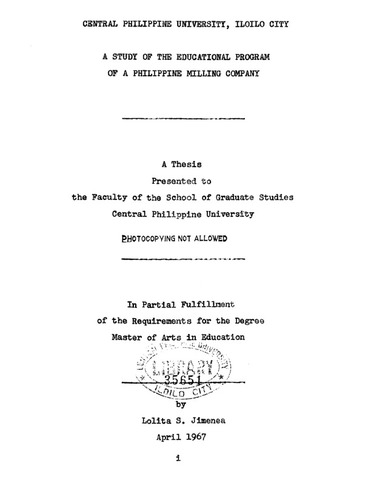A study of the educational program of a Philippine milling company

Page views
577Petsa
1959May-akda
Tagapayo ng Tesis
Tagapangulo ng Panel ng Depensa
Miyembro ng Defense Panel
Magbahagi
Metadata
Ipakita ang buong tala ng item
Abstract
The basic purpose of this study was to find out whether or not a milling company has a contribution to make to education. It aimed to consider the present attitudes and standards of managers toward training. The study, likewise, intended to probe deeper into the kind of attitude inculcated or created in the employee through the training given to him by the company.
To accomplish the purpose of this study, a survey was conducted in Victorias Milling Company, Inc. Various educational units of the industrial complex were also surveyed. Staffing policies and procedures and personnel operation records were examined in the personnel department to see if there was a planned systematic training program for determining personnel requirements in advance of needs. Promotion and transfer programs were carefully evaluated. Data on employee benefit plans were gathered and questionnaires were distributed to ascertain the response of employees towards the various benefit plans extended them by the company. Previous studies made about the company were utilized as background material for the study.
The company believes in training employees but does not appear to have a full understanding of what training should be. It does not allow trainers or experts to make an appraisal of factory conditions before the training proceeds. The most popular method used is "on the job" training. Sometimes it utilizes conferences, committee meetings, study leave and observation tours. The kind of training being extended now to the employees does not predominantly fall within certain accepted principles of industrial training.
The concept and philosophy behind their training program fall below the ideal. The study further revealed that the employee does not receive as much training as he needs. There is only a minimum degree of training being extended to a majority of employee.
The following are suggested recommendations of the study:
1. Top management should be convinced of the necessity for an active part in training.
2. A special kind of training should be encouraged— one that has to do with the development of conceptual skill, imagination and judgment. Instead of being taught a skill that will soon become outmoded the worker should be given an intensive theoretical grounding (by lecture and demonstration) on the basis and purposes of the larger task and should also be acquainted with its various phases. In so doing the worker will think about his job in terms of general concepts and will increase his mental flexibility.
3. The educational program of Don Bosco should be supplemented with supervised internship in which students could accept a training position in the company with continued supervision by faculty members; or students may be required to hold selected jobs during the school term and to prepare reports on their work experiences as part of the collegiate program.
4. Developing and maintaining on a continuous assessment basis realistic qualification requirements for promotion and transfer including knowledge, skills, aptitudes, personal characteristics and physical abilities derived from analyses of duties actually performed and the existing environmental factors.
5. Advice and assistance should be available to employees who are interested in developing themselves.
6. There should be a program for following up all placements. Such follow-ups should be used in effecting necessary job adjustments and in evaluating and improving standards and selection techniques.
7. More attention should be given to the way the workers themselves feel about the satisfaction they are seeking from their jobs realizing that the pay check and tangible job benefits are only a small part of the over-all needs that must be met by the management to create a high level of morale.
Personal needs such as participation, recognition, consultation, opportunity, security, and communication should be given importance by management since these needs are not always consciously felt or explicitly expressed.
Paglalarawan
Abstract only
Mungkahing Sipi
Jimenea, L. S. (1959). A study of the educational program of a Philippine milling company (Unpublished Master’s thesis). Central Philippine University, Jaro, Iloilo City.
Uri
ThesisMga Paksa
Mga keyword
Kagawaran
School of Graduate StudiesDegree
Master of Arts in EducationLokasyon ng Istante
GSL Theses 378.242 J564
Pisikal na paglalarawan
207 leaves


